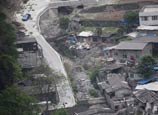
"China and the ASEAN 5 - Indonesia, Malaysia, Philippines, Thailand and Vietnam - are more domestically driven and, therefore, continue to enjoy relatively high and stable growth rates. This is not the case elsewhere," S&P said.
The paradox of continuing poverty amidst strong growth has been explained by analysts here.
Norio Usui, ADB senior country economist, said that the government must solve the problem of jobless growth if it hoped to reduce poverty.
"I am not surprised at all. The benefits of strong economic growth have not spilled over to the people because they still cannot find a job," Usui was quoted as saying in a report.
In January 2013 jobless rate stood at 7.1 percent, with a further 20.9 percent underemployed or those working fewer than 40 hours a week. About 41.8 percent of the underemployed are in the farming sector.
Professor Benjamin Diokno of the University of the Philippines School of Economics said that the strong economic growth in 2010 and 2012 "were not enough to extricate a lot of people from the poverty trap."
Sen. Ralph Recto, chairman of the ways and means committee of the Philippine Senate, said that only the rich and the educated have benefited from the infrastructure projects of the government and not the poor and uneducated.
"This led to income inequality with the rich getting richer and the poor poorer," Recto said.
Presidential Spokesman Edwin Lacierda said the challenge now is to spur growth in agriculture to create more jobs, increase production and ensure that the production translates to a greater income for farmers since the bulk of the population was still in the agricultural sector.
Lacierda noted that private investments had increased, and that public infrastructure spending in 2012 was around 250 billion pesos (6.25 billion U.S. dollars).
The National Economic and Development Authority (NEDA) said it hoped to see improved results given new investments in infrastructure, agriculture and manufacturing.
"Although this first semester result on poverty incidence is not the dramatic result we wanted, we remain hopeful that, with the timely measures we are now implementing, the next rounds of poverty statistics will give much better results," NEDA Director General and Economic Planning Secretary Arsenio M. Balisacan said at a briefing.


















 Giant pandas safe in quake-hit zone
Giant pandas safe in quake-hit zone


![]()
